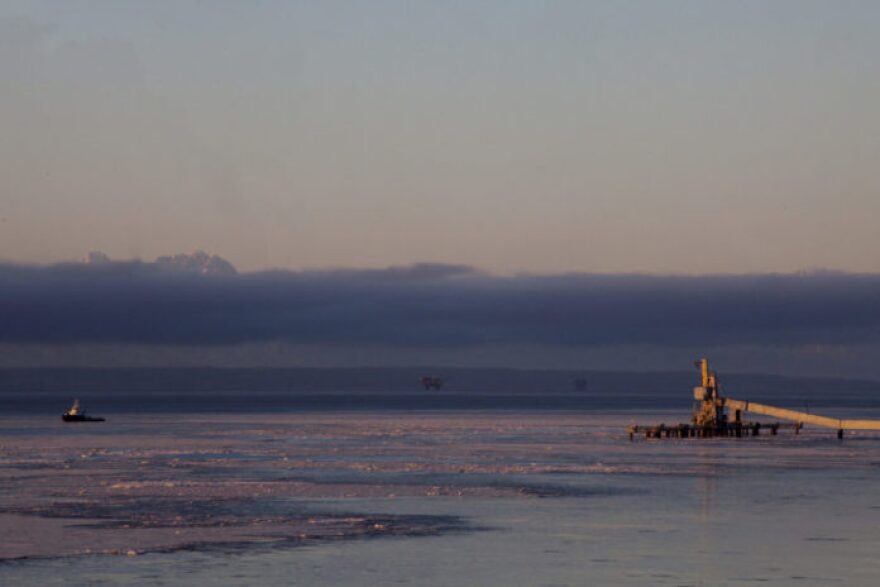The U.S. Department of the Interior said oil and gas companies should pay more to extract fossil fuels from federal lands and waters, like the million acres that could be up for bid soon in Cook Inlet.
It’s one of several recommendations the department made in a report released over the holiday weekend. And it’s drawing ire from both sides of the aisle.
Liz Mering, advocacy director of Homer environmental nonprofit Cook Inletkeeper, said it’s about time the federal government updates its century-old leasing policies.
“The big hole in this is that it doesn’t talk about climate change at all," she said. "And so it talks about finances. And if this was even 20 or 30 years ago, maybe it would have been appropriate to just make them pay us back. But it doesn’t account for the real damage climate change is doing.”
In January, the Biden Administration said it would review its process of selling tracts for oil and gas development when it hit pause on the lease sale in Cook Inlet, citing concerns about climate change.
The new 18-page report, published months later, is the product of that review.
The biggest takeaway: The feds should raise their royalty rate. That’s the percentage of revenue that oil and gas producers have to pay the government based on the amount of fuel they get out of the ground on any slice of federal land or on the ocean floor. The report said increasing what the companies are paying will create fairer returns for taxpayers.
Right now, the federal royalty rate is a minimum 12.5 percent for offshore leases. And that hasn’t changed in decades. The money is divided between the feds and the state.
The Interior’s report does not suggest new royalty rates.
The report also recommends raising bond rates, which it said will better ensure companies properly clean up their abandoned wells. Another suggestion is that companies meet historical environmental and safety standards before they purchase leases.
While Mering, with Inletkeeper, said the report doesn’t do enough, industry advocates say it’s too strict.
Kara Moriarty, head of the Alaska Oil and Gas Association, said the industry is already struggling to rebound from the pandemic, and increasing royalty rates would be a serious blow. She said the recommendations all but ban offshore drilling.
“It's just disheartening that they took 10 months to say what I think we expected them to say in the first place," she said.
U.S. Sen. Lisa Murkowski had a similar take.
“This report is exactly what we thought it would be: a series of preordained conclusions that are designed to end federal oil and gas production,” she said Monday. “President Biden campaigned on that, and his administration is now advancing what amounts to a death-by-a-thousand-cuts strategy to achieve it.”
Meanwhile, the federal government is moving toward holding a lease sale in Cook Inlet.
The Department of the Interior tried to pause that sale, and a sale in the Gulf of Mexico, while its review was underway. But it said it was over a barrel after a district court judge ordered the sales to continue, following a lawsuit from Alaska and a dozen other states. Last month’s sale in the Gulf of Mexico was the largest in the country’s history.
It’s unclear how the new report will impact the Cook Inlet sale. The feds haven’t laid out a concrete plan to enact the report’s recommendations.
And some of the recommended reforms overlap with provisions in the large Build Back Better Bill that is making its way through Congress. That bill also would prohibit offshore leasing on both U.S. coasts. Alaska and part of the Gulf of Mexico are not included.
Mering said it’s possible royalty rates will be higher for companies bidding on leases in the Cook Inlet auction, spreading more of the wealth from extraction to taxpayers.
Still, she hopes the Biden administration can stop the sale in Cook Inlet from happening altogether.
“It’s very clear that they do have the ability to cancel the lease sale proposed in Cook Inlet. And so we will still be asking them to do that," she said.
Moriarty said the oil and gas industry trade group will be making a case of its own.
“For us, it just means we need to double down and to continue to try to communicate the best we can why consistent lease sales are important in both the Cook Inlet and the Beaufort Sea, and why it makes sense to continue to develop our oil and gas resources," she said.
Even without legal challenges, a sale in Cook Inlet is not guaranteed. The Bureau of Ocean Energy Management canceled lease sales in 2006, 2008 and 2010 in Cook Inlet due to lack of industry interest.





